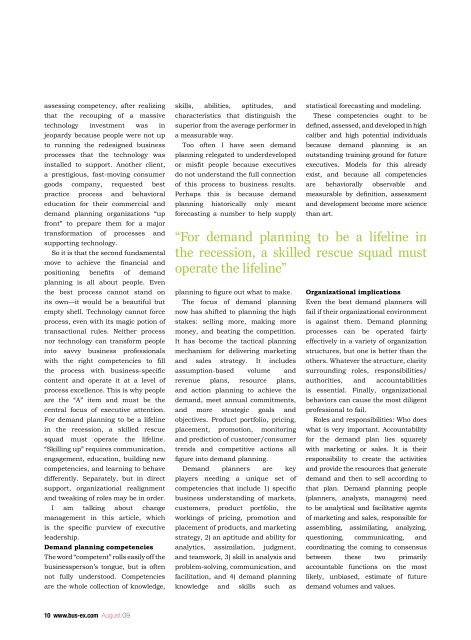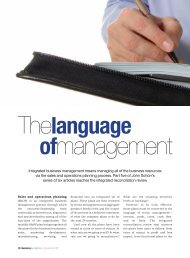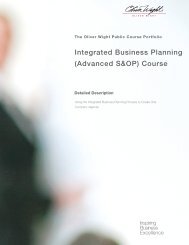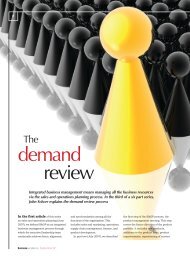Demand Planning Article: Getting ready for change - Oliver Wight ...
Demand Planning Article: Getting ready for change - Oliver Wight ...
Demand Planning Article: Getting ready for change - Oliver Wight ...
You also want an ePaper? Increase the reach of your titles
YUMPU automatically turns print PDFs into web optimized ePapers that Google loves.
assessing competency, after realizingthat the recouping of a massivetechnology investment was injeopardy because people were not upto running the redesigned businessprocesses that the technology wasinstalled to support. Another client,a prestigious, fast-moving consumergoods company, requested bestpractice process and behavioraleducation <strong>for</strong> their commercial anddemand planning organizations “upfront” to prepare them <strong>for</strong> a majortrans<strong>for</strong>mation of processes andsupporting technology.So it is that the second fundamentalmove to achieve the financial andpositioning benefits of demandplanning is all about people. Eventhe best process cannot stand onits own—it would be a beautiful butempty shell. Technology cannot <strong>for</strong>ceprocess, even with its magic potion oftransactional rules. Neither processnor technology can trans<strong>for</strong>m peopleinto savvy business professionalswith the right competencies to fillthe process with business-specificcontent and operate it at a level ofprocess excellence. This is why peopleare the “A” item and must be thecentral focus of executive attention.For demand planning to be a lifelinein the recession, a skilled rescuesquad must operate the lifeline.“Skilling up” requires communication,engagement, education, building newcompetencies, and learning to behavedifferently. Separately, but in directsupport, organizational realignmentand tweaking of roles may be in order.I am talking about <strong>change</strong>management in this article, whichis the specific purview of executiveleadership.<strong>Demand</strong> planning competenciesThe word “competent” rolls easily off thebusinessperson’s tongue, but is oftennot fully understood. Competenciesare the whole collection of knowledge,skills, abilities, aptitudes, andcharacteristics that distinguish thesuperior from the average per<strong>for</strong>mer ina measurable way.Too often I have seen demandplanning relegated to underdevelopedor misfit people because executivesdo not understand the full connectionof this process to business results.Perhaps this is because demandplanning historically only meant<strong>for</strong>ecasting a number to help supplyplanning to figure out what to make.The focus of demand planningnow has shifted to planning the highstakes: selling more, making moremoney, and beating the competition.It has become the tactical planningmechanism <strong>for</strong> delivering marketingand sales strategy. It includesassumption-based volume andrevenue plans, resource plans,and action planning to achieve thedemand, meet annual commitments,and more strategic goals andobjectives. Product portfolio, pricing,placement, promotion, monitoringand prediction of customer/consumertrends and competitive actions allfigure into demand planning.<strong>Demand</strong> planners are keyplayers needing a unique set ofcompetencies that include 1) specificbusiness understanding of markets,customers, product portfolio, theworkings of pricing, promotion andplacement of products, and marketingstrategy, 2) an aptitude and ability <strong>for</strong>analytics, assimilation, judgment,and teamwork, 3) skill in analysis andproblem-solving, communication, andfacilitation, and 4) demand planningknowledge and skills such asstatistical <strong>for</strong>ecasting and modeling.These competencies ought to bedefined, assessed, and developed in highcaliber and high potential individualsbecause demand planning is anoutstanding training ground <strong>for</strong> futureexecutives. Models <strong>for</strong> this al<strong>ready</strong>exist, and because all competenciesare behaviorally observable andmeasurable by definition, assessmentand development become more sciencethan art.“For demand planning to be a lifeline inthe recession, a skilled rescue squad mustoperate the lifeline”Organizational implicationsEven the best demand planners willfail if their organizational environmentis against them. <strong>Demand</strong> planningprocesses can be operated fairlyeffectively in a variety of organizationstructures, but one is better than theothers. Whatever the structure, claritysurrounding roles, responsibilities/authorities, and accountabilitiesis essential. Finally, organizationalbehaviors can cause the most diligentprofessional to fail.Roles and responsibilities: Who doeswhat is very important. Accountability<strong>for</strong> the demand plan lies squarelywith marketing or sales. It is theirresponsibility to create the activitiesand provide the resources that generatedemand and then to sell according tothat plan. <strong>Demand</strong> planning people(planners, analysts, managers) needto be analytical and facilitative agentsof marketing and sales, responsible <strong>for</strong>assembling, assimilating, analyzing,questioning, communicating, andcoordinating the coming to consensusbetween these two primarilyaccountable functions on the mostlikely, unbiased, estimate of futuredemand volumes and values.10 www.bus-ex.com August 09
















